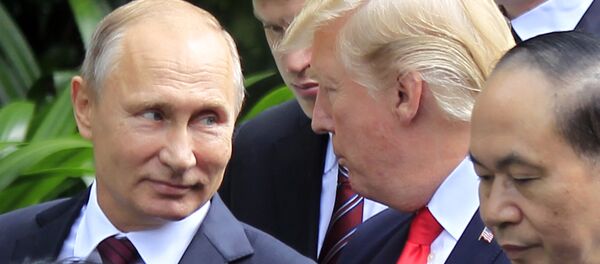Sputnik: How likely are the US and Russian presidents to agree on a US withdrawal from Syria? Do you think it's on the cards?
Thomas Whalen: Well if it's being reported on CNN, I have a feeling the leak probably came directly from the White House staff, so probably a good chance. Given the noises the Trump administration has been making in the last few weeks, it certainly wouldn't be surprising.
Thomas Whalen: I think Syria is a loss to the coalition forces for some time. The civil war has gone against the anti-Assad forces which the United States and its allies have backed. This is more or less recognizing a reality on the ground more than a real desire by the coalition to pull out.
Sputnik: What would this withdrawal mean for the balance of power in the region, as well as the situation in Syria's southwest?
Thomas Whalen: I think Iran benefits the most here in terms of the balance of power in the Middle East, and this is of course going to strike some fear into the heart of Saudi Arabia and other Sunni Muslim nations in the region.
Sputnik: What are your overall thoughts on this proposed meeting between the two leaders?
Thomas Whalen: I think it never hurts to discuss with your adversary certain issues pertaining to the global balance of power, and you certainly don't want to step on each other's feet when there's a certain shared interests. We have to hear what each side says. We don't really get a clear sense right now. There has been talk about Ukraine, but certainly if [Trump] recognize[s] for example the seizure of Crimea*, I think that's going to really upset a lot of people in the US foreign policy establishment, not to mention members of Congress, who see that as an aggressive move made by Russia earlier.
Thomas Whalen: It's certainly not in Russia's interest to minimize Iran's influence. Russia has a military foothold in the Middle East, something it's always wanted since the time of the Czars. And Iran is its great ally now, you could argue. So I just don't see, aside from maybe some vague verbal assurances on Russia's part, that such an outcome would take place.
Sputnik: How likely do you think the American pullout from Syria, if it does happen, will be supported by Congress? Will it find Congressional support?
Thomas Whalen: Probably not, but they really don't have much say or leverage here. The American electorate is not putting Syria at the top of their list of concerns here, especially with regard to foreign policy. I think it will happen, and Congress will just have to swallow hard.
*Crimean authorities organized a referendum in March 2014 on whether to withdraw from Ukraine and join Russia after the Maidan coup d'état in Kiev a month earlier. With a voter turnout of 83.1%, over 96% of the peninsula's residents voted to return to Russia; the referendum took place just over 60 years after Soviet leader Nikita Khrushchev transferred Crimea to the Ukrainian Soviet Socialist Republic in February 1954.
Dr. Thomas Whalen is an associate professor of social science at Boston University. The views and opinions expressed by Dr. Whalen are those of the expert, and do not necessarily reflect those of Sputnik.



